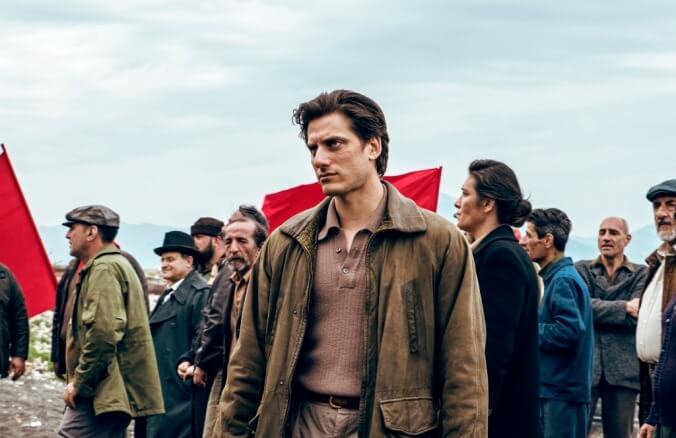Jack London gets an Italian makeover in the tragic and romantic Martin Eden
Film Reviews Movie Review

Note: The writer of this review watched Martin Eden from home on a digital screener. Before making the decision to see it—or any other film—in a movie theater, please consider the health risks involved. Here’s an interview on the matter with scientific experts.
The documentarian and film essayist Pietro Marcello has long demonstrated a fascination with the marginalized and working class of Italian society—a humble shepherd in Lost And Beautiful, an ex-con and his trans lover in The Mouth Of The Wolf. Always skirting convention, his singular style unites a background in art history, a predilection for archival footage, and a fusion of fiction and nonfiction elements toward humanistic storytelling with a powerful romantic streak. With Martin Eden, his first narrative feature, Marcello doesn’t stray from this path so much as up the ante. The epic story of a charismatic sailor striving to become a writer (or “one of the eyes through which the world sees”), the film considers the relationship between individual aspiration and community-oriented political convictions. Yet without dumbing down its message, Marcello’s sweeping Künstlerroman has all the pleasurable characteristics of a simmering romance and a poignant tragedy, too.
An adaptation of Jack London’s 1909 semi-autobiographical novel, Martin Eden switches out fin de siècle Oakland for Naples at an unspecified point in the 20th century, drawing from different periods in the history of Italian modernism—the gritty neorealism of the 1940s, the dreamy decadence of Luchino Visconti—while including sartorial details that could belong to the present day. As in other recent European movies filled with small anachronisms that complicate their period settings (see: Christian Petzold’s Transit or Alice Rohrwacher’s Happy As Lazzaro), time in Martin Eden has been folded into itself.
Early on in the film, our eponymous, working-class hero admires a painting of a ship at sea: “From a distance it looks beautiful, but close up you only see stains.” It’s an illuminating observation for a movie filled with sumptuous imagery: clear blue skies, crystal waters, lush countryside vistas captured in vivid, saturated 16mm. Such captivating beauty corresponds to our protagonist’s naive idealism, and the rose-colored glasses through which he views an upper-crust world of dandies and refined intellectuals.
After rescuing a drunken nobleman from a beating, Martin Eden (Luca Marinelli) meets the young man’s dainty sister, university student Elena Orsini (Jessica Cressy). The two enter into a courtship despite their class differences. Elena, like most of the women in Martin Eden, finds herself smitten with the handsome, sanguine proletarian; Martin, struck by Elena’s beauty and sophistication, aspires to be like her and throws himself into the pursuit of self-education, eventually resolving to become a great writer. The couple’s romance, captured with intimate closeups and accompanied by a jaunty Europop soundtrack, is rapturous. But Martin’s increasingly provocative ideas throw a wrench in Elena’s dreams of a happily-ever-after.
Against all odds, Martin comes into his own with the spiritual guidance of Herbert Spencer, a 19th-century philosopher and early proponent of natural selection, and Russ Brissenden (Carlo Cecchi), an aging poet and socialist. But the long road to writerly recognition is riddled with disappointment. With assembly line consistency, Martin receives countless rejections from faceless editors—a triggering reminder for any literary hopeful navigating the modern culture industry. Martin’s writing, which centers working-class experiences and the bleak Neapolitan milieu in which he was raised, is too raw and depressing, Elena claims. She offers to connect her lover with an office job that promises speedy upward mobility. No one wants to read about death and struggle, but fashions change, and as exemplified by Charles Baudelaire’s Flowers Of Evil (a book that Martin peruses in his first encounter with Elena), even the morbid and grotesque can be packaged to have wide popular appeal.
An impromptu appearance at a socialist rally, in which Martin pontificates about the notion that society is premised on the survival of the fittest, puts the fledgling intellectual on the radars of elite tastemakers. And in what feels like the snap of two fingers, his transformation is complete: Martin not only sidelines Elena but his political commitments as well when he chooses a path of individualistic glory that exalts, essentially, his independent “brand.” A time-jump shows the once natural, statuesque Martin shriveled by wealth, fame, and substance—his hair is bleached blond, his teeth are stained. Marinelli, who won the Best Actor award at last year’s Venice Film Festival, masterfully transitions from the spirited, wholesome Martin of old to the oily, wild-eyed Martin of the future while maintaining the character’s fiery vitality.
As the story hurls toward tragedy, Marcello’s experimental touches—namely the interweaving of unidentified archival and documentary footage—seem at first ambiguous in function. Yet these interludes, which include everything from a sinking ship, a grinning crew of sailors, train passengers, and a pair of child dancers, accrue more significance the deeper we plunge into Martin’s individual journey, and the physical and spiritual degradation he undergoes in achieving a bourgeois vision of success. The anonymity of these images, plucked from history, contextualizes Marcello’s sentimental education. This radical gambit declares that individual stories of great men—or fallen ones—are inseparable from the communities from which they’re born.
2 Comments
Sounds like an art house cinema must-see, and I duly confess that my curiosity has peaked regarding exactly what “substance” led to his teeth being stained.
Luca! My future husband! So great in Old Guard!